The Metamovie Presents: Alien Rescue is a VR experience directed by Jason Moore in which roleplaying as the Hero or an Eyebot takes center stage. An experiment in participatory storytelling that speaks to its fans like few other works have.
Did you receive your Hogwarts letter yet? For years I’ve listened to people ask this question. Not only does it show their interest in the world JK Rowling created, but it also brings to the forefront a deep desire we all have: to become part of the stories we love, to feel that those fantastical worlds are ours, and to get closer to characters we feel something for.
The first time I experienced VR, it took me to Wonderland and turned me into Alice.
You go through something like that and you simply cannot go back to ignore that the possibility is there. That there is a medium that not only brings you emotionally and intellectually inside the narrative, as only the best media do… but it also leads your body into it and makes you believe you are there as the creator of the story and of everything that is happening around you.
Over the years I’ve come across some amazing experiences that aimed at this, but none as oriented to this goal as The Metamovie Presents: Alien Rescue, created by Jason Moore.
In this movie you play the lead role. As you move through this vast, cinematic VR adventure, you’ll be joined by supporting characters played by live actors who respond to anything you do or say in real-time. The MetaMovie lets you be the hero in a revolutionary VR cinematic experience (from The Metamovie Presents: Alien Rescue official website)
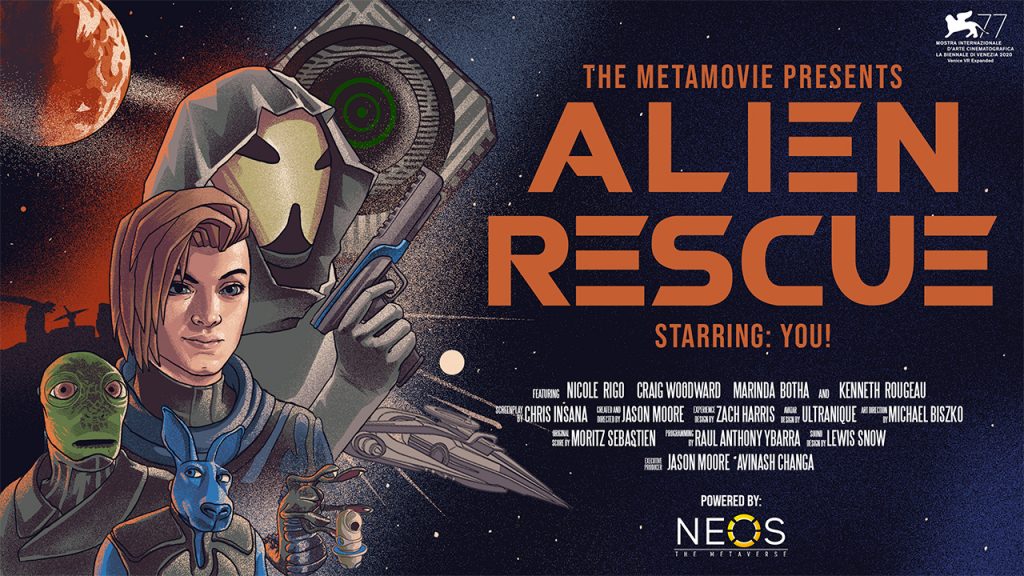
Its first part was presented at the VeniceVR Expanded of the 77th Venice Film Festival in a beta version that intrigued me crazily, despite the technical problems I had to access it.
In its scenes, its characters, and its basic idea open to future developments, I recognized the soul of participatory culture, a concept developed by academic Henry Jenkins to explain the changing role of the audience in recent decades: users have gone from being consumers of media products to active co-producers of them, using their own creativity to add to the story rather than simply accepting it as it is. They have become prosumers. And that’s exactly who the user is in Alien Rescue.
When you choose to be the Hero – one of the two characters you can play, the other being the eyebot, an active observer – the story is in your hands. You can literally have multiple versions of it and multiple endings, because the actors that virtually surround you, in an improvised way, follow your lead and tailor their responses to you.
Sure, there is a plot to follow, a goal to reach, but like a videogame or, rather, like a Dungeons & Dragons campaign, the branching structure of the work allows you to test incredible possibilities and alter the narrative in unexpected ways. Furthermore, it gives you the chance to shape one of the essential elements of a story: the characters.
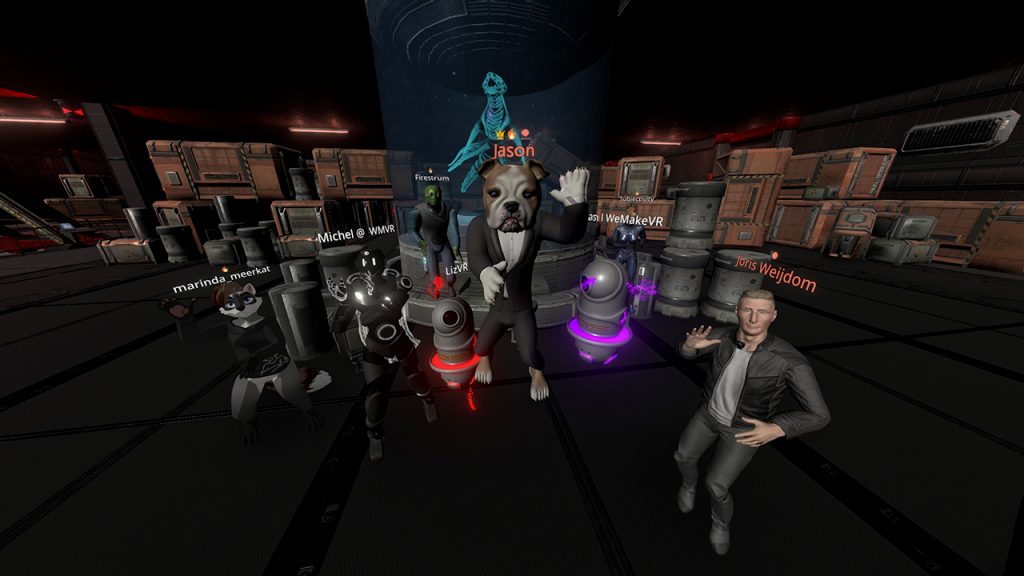
This is one of the things that really stands out in Alien Rescue: you don’t just feel that the story is partially up to you. You go into that virtual world knowing that who you are and how you choose to play gives you some power over the other characters as well, and over the relationships you form with them.
Something that is very relevant for a specific kind of audience, the one made up of “active fans” of media productions. People who write stories about their favourite products, or add their own interpretations, or cosplay their favourite characters because they want to take their place or just celebrate their stories.
And in fact, The Metamovie Presents: Alien Rescue received a honorable mention for the Fanheart3 Awards, collateral awards at the Venice Film Festival dedicated to movies and immersive experiences that have the potential to impact fan culture and the production of fanworks.
We had the chance to meet Jason Moore, director of The Metamovie Presents: Alien Rescue, for a long chat about this experience and his future plans for this work. Here’s what he told us.
To find yourself in the story: the dream that inspired “The Metamovie Presents”
When I was nine my parents took me to see Star Wars, the original one from 1977. There was a scene when Luke Skywalker was in the cockpit of the Millennium Falcon, shooting at the tie fighters and Han Solo turned to him and said “Great shot, kid”. And there, in that moment, was when I realized that all I wanted was to be in that spaceship right next to Luke.
Every kid who saw that movie probably felt that way. We wanted to be part of that story and of that universe. And this idea has always stayed with me.
I’m a filmmaker, I’ve been making visual stories in film and television and theater for all my life and I’ve always used whatever tools were available at the time to realize this goal. And when virtual reality technology became more widely available and I started to see what immersive storytelling could be like, I immediately knew that VR could help me reach this goal in ways I had never believed possible before.
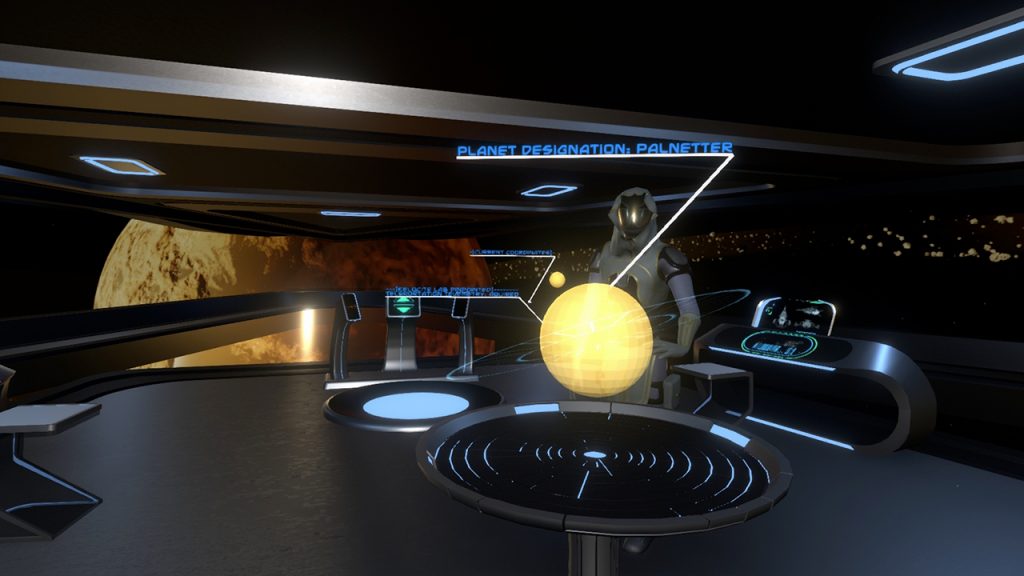
The importance of user recognition in VR stories
In early VR stories, there was limited interactivity and the world you were in ignored you. I didn’t really feel like I was in it. And so I started asking myself: what needs to happen to make me feel part of this world? And I realized that a critical element was that the world needed to recognize the audience. That, quite soon, led me to the notion of live actors who could acknowledge the audience members.
In 2017 I found a metaverse platform called High Fidelity. There I built simple three-dimensional worlds, I started recruiting actors and I created short scenes that I could use as a series of experiments. I wanted to understand how the audience fell into the story, what worked and what didn’t.
One thing I discovered, for example, is that being recognized was not enough. Having characters wave at you was good, but it did not fill the need to really be there with them. Users wanted more agency and that was what I tried to accomplish with my following work, The Heist.
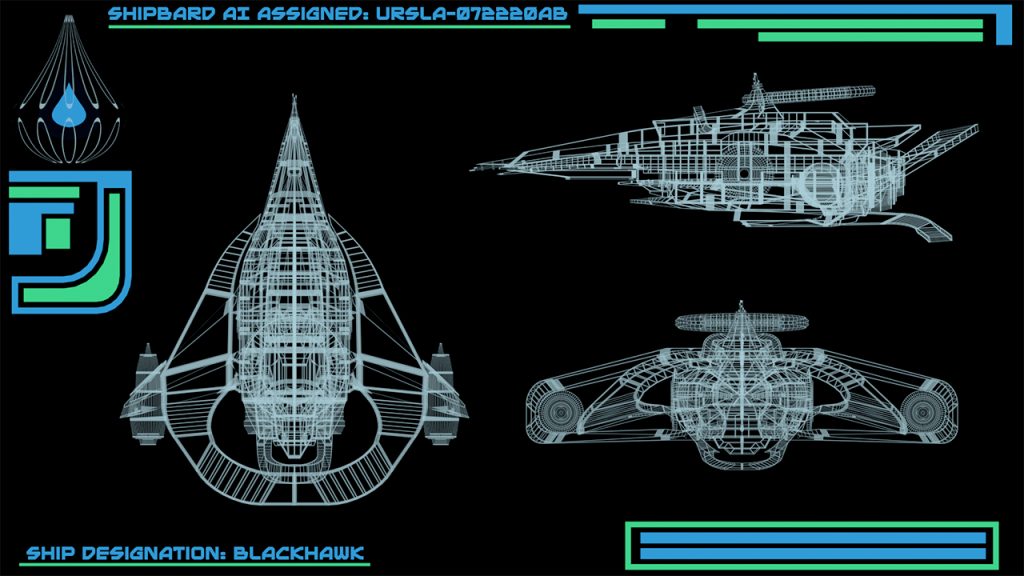
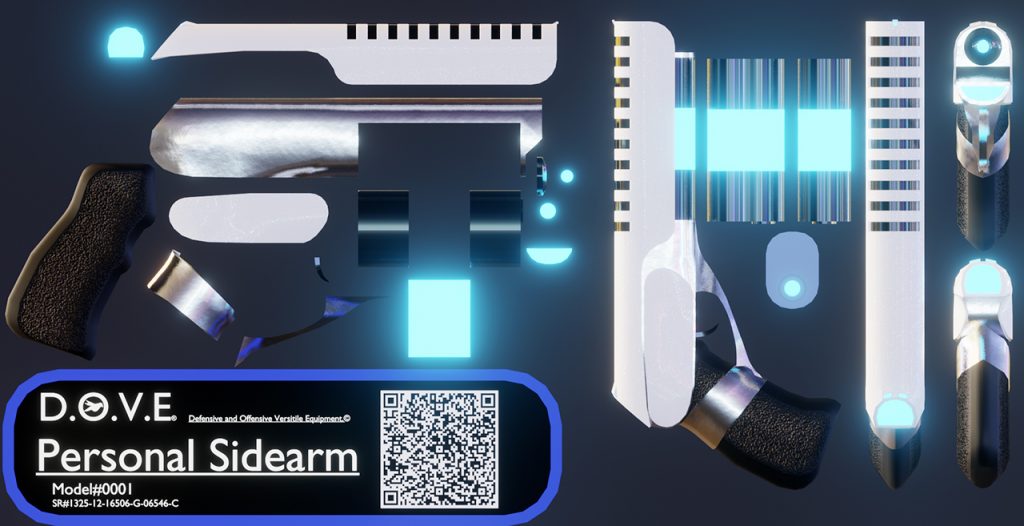
Giving more agency to the users: from The Heist to The Metamovie Presents
The Heist is about a showdown during a bank robbery. The bad character was a Joker-like criminal and you, the user, were there to help an undercover cop bust him.
In this work I gave the users the chance to talk and do whatever they wanted, telling the story not in sketches but from the beginning to the end, to see how they could affect it.
I’m constantly trying to find a balance between telling a story and the need of the users to shape it.
Sometimes they want to take your narrative in a place you’re not prepared to go and this can make things very complicated. In The Heist I really wanted the users to play the heroic character that helped the undercover cop. But every one of them wanted something different, and that was to join the bad guy.
This made me realize that there was still much to learn, but also that the core idea was good. Feedback was always incredibly positive and everybody loved being the center of attention, having agency and being inside the world.
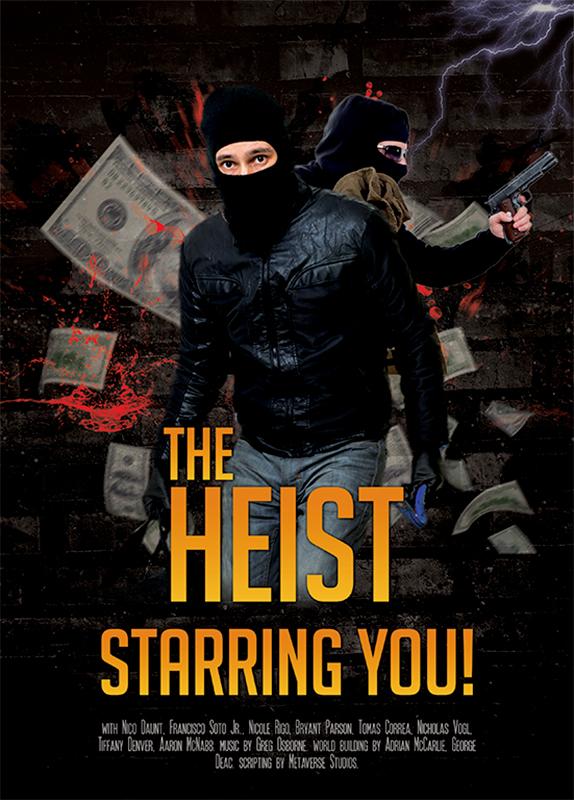
A Kickstarter campaign to fund the following project marked the beginning of the next big phase: it helped me finance Alien Rescue, and it raised awareness around this kind of works. But then High Fidelity crashed, and I had to find a new metaverse to work in. In the end, I went for NeosVR, the most technologically advanced metaverse engine currently available.
I met a team of designers and I brought the actors back in. Then I wrote a script that was much more ambitious than my previous projects, and much longer: Alien Rescue was born and at its core, the same question: how much agency can we give the audience and how.
At the intersection of different media and the role of Dungeons and Dragons
The Metamovie Presents: Alien Rescue moves from a very cinematic screenplay and it borrows ideas and theories from cinema. To all that, it adds role-playing activities such as those of D&D – Dungeons & Dragons.
Dungeon and dragons is a very important part of my upbringing but I needed to go deeper into it for Alien Rescue. I actually reached out and found a dungeon master with about 30 years of experience and I hired him as a consultant on the project. I needed him to understand how to help my heroes. How do I guide them in the experience? And how much do I steer the story or do I indulge them and their ideas?
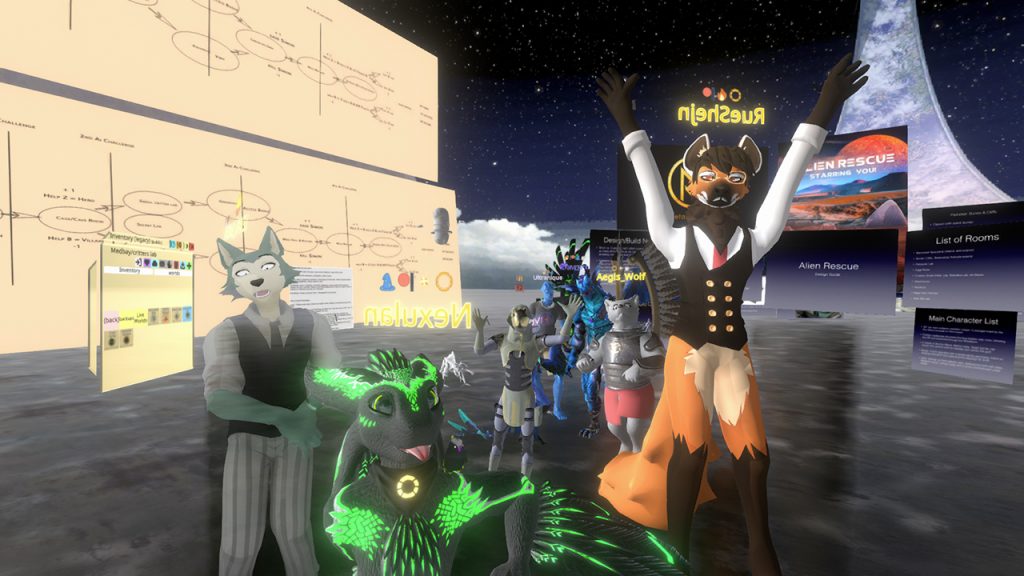
I think one of the big lessons I learned from studying how Dungeon Masters work was to let go of agency. You might have an interesting story but you have to let the other players contribute and contribute a lot. My actors are trained as “little dugeon masters”, working together to help shape the story for our one hero and for the eyebots.
Another thing I learnt was to “never split the party”. In my initial plan, I wanted to test the possibility of having two heroes, both talking and with full agency. But my DM convinced me not to, because it never works and it’s too complicated. And he was right.
We also owe a lot to immersive interactive theater, but we are also taking a big leap forward because the addition of virtual reality amplifies it and turns it into something new. We’re not on a tiny stage in a small theater. We’re in this big immersive world and there’s a lot of activity going on and the way the actors and our hero interact is different than the one you experience in traditional immersive theatre.
However, the live, social experience is the same: anything could go wrong, anything could happen. You even get a little nervous about it. There’s this electricity that happens in a live performance and that, to me, is a big part of the enthusiasm and of the excitement.
And, finally, there are also elements from videogames. The branched narrative, obviously. But also, for me the video game aspect is the 3D world I’m in and the way I can interact with the environment around me.
So, we’re overlapping video games, DnD dynamics, theatre and cinema, and what matters is to find the right balance for all these ingredients.
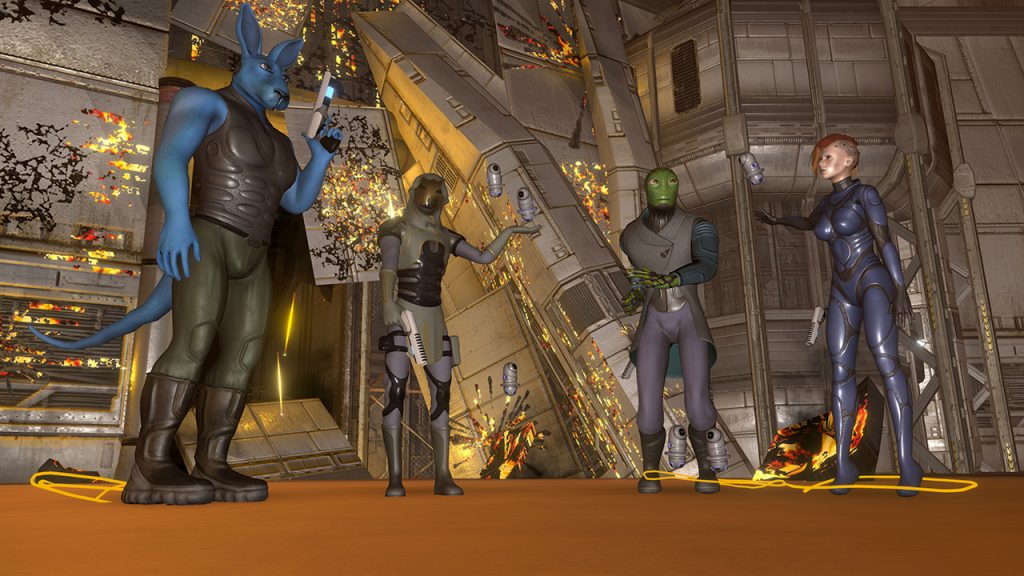
Hero or eyebot, that is the question
In Alien Rescue you can play the role of the hero or choose to be an observer, an eyebot.
As for the hero, everybody does it differently and every single performance is completely different from the other. It’s like it’s a new show every time. We categorized five or six hero playing styles and it’s very good for us to analyze our heroes in the early scenes and understand the kind of person we’re dealing with and what to expect. The more data we have, the more we can pivot our own acting and the story to best suit that person.
As for the eyebots, we have them to give access to Alien Rescue to a wider audience. However, we never really imagined just how much agency our eyebots could want too. I assumed we were bringing in some observers and they would be happy to fly around the scene and watch, but I should have known better. As I said, every audience member wants to be recognized, and this is true for those playing the eyebots too. They couldn’t talk but many people still found ways to make themselves be noticed.
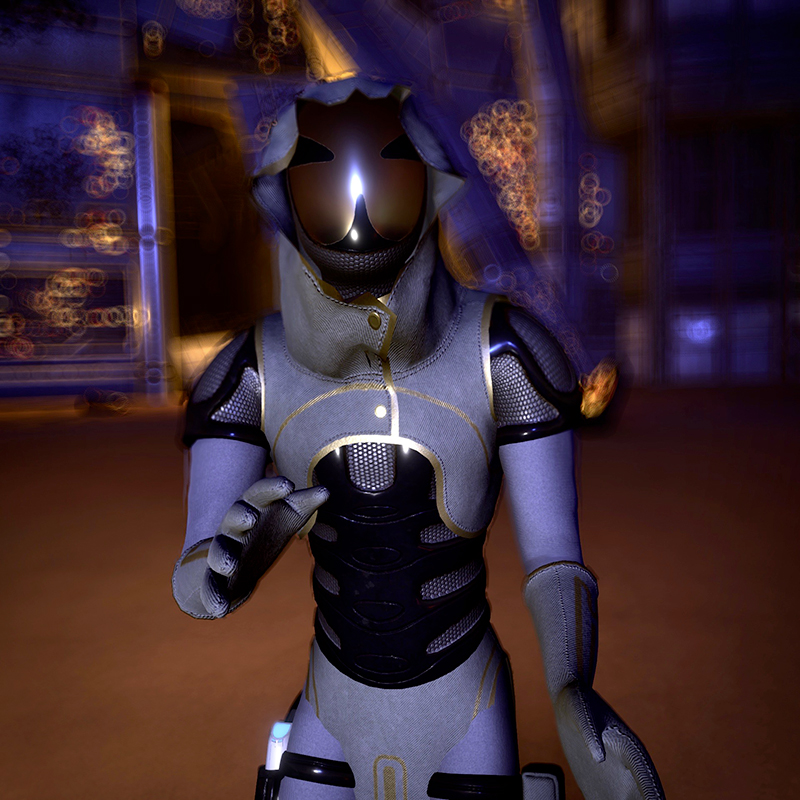
We’re currently working on giving the eyebots a little more agency: we have created a system for all eyebots to flash green or red lights with their controls, which gives them a simple but effective way to silently communicate with the cast. Additionally, I have constructed the story in such a way that there is an element (…it’s a secret!) that can only be unlocked by an eyebot.
I guess we just have to keep experimenting and testing. I think this is an exciting time for storytelling in VR.
Challenges of a live roleplaying experience in VR
One of the things that surprised me was the anxiety some people experienced before the show. I didn’t observe it consistently until we got to Venice but there I heard a lot of people saying “I had so much fun but I was nervous at first”. When it’s just the heroes and the characters, as in previous tests, the anxiety one experiences goes away very quickly: our actors do an amazing job of bonding with the heroes. They’re very catering.
But with more than ten eyebots observing your every move, the notion of “What if I mess this up? What if I don’t do my roleplaying correctly?” is very strong. It is something we are studying to understand if we need to work on it and find ways to make users more comfortable.
Another thing that is a bit problematic is the motion sickness. I know that my projects make it worse because we move a lot and we are always traveling and flying up and down. There is not much we can do about it.
However, we always talk to our audiences about whether or not they have the necessary technology to make the experience work and have a good frame rate. But not everybody makes it to the end! We actually lose people along the way. Sometimes it happens because they get sick, other times their computer crashes – the technology is so new.
Sometimes eyebots simply get lost. The Blackhawk, our spaceship, is huge: it’s 200 meters long, 200 meters tall, four decks. We do not even know how many rooms are there! It’s easy to stay behind and miss the group. That’s why we created the scene where the hero goes and picks up the battery: not only to show the beautiful spaceship our developer created, but also to teach our eyebots to keep up with the hero and our hero to wait for them.
So, we’re discovering all the flaws and the places where things can go wrong, taking notes and finding ways to fix them.
From 2020 VeniceVRExpanded on
What we presented at Venice was the first half of the narrative script.
The Metamovie Presents: Alien Rescue is running much longer than I was expecting, almost always one hour if my actors are keeping the pace up, sometimes longer if we indulge the hero and let them do and say whatever they want. Nobody wants to leave!
But I don’t think most audiences would like to be in Alien Rescue if it lasted two hours. That’s too long. So, my next step is to keep doing performances while building the rest of the sets but also while I rewrite what I already have.
That’s the real challenge now, storytelling. And also to find a way to make Alien Rescue run on its own while I start on all the other metamovie projects I have. This is going to take me all the way through 2021.
The Metamovie Presents: Alien Rescue is an experience directed by Jason Moore and produced by The Pack and WeMakeVR.
You can follow the updates on its official website, where new dates to join the adventure will be available soon!



Leave a Reply
You must be logged in to post a comment.